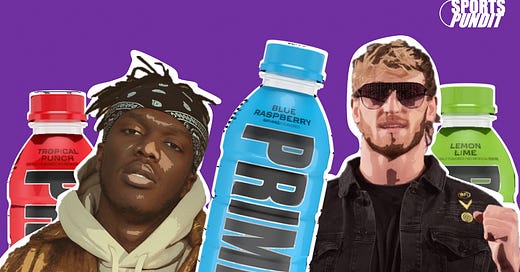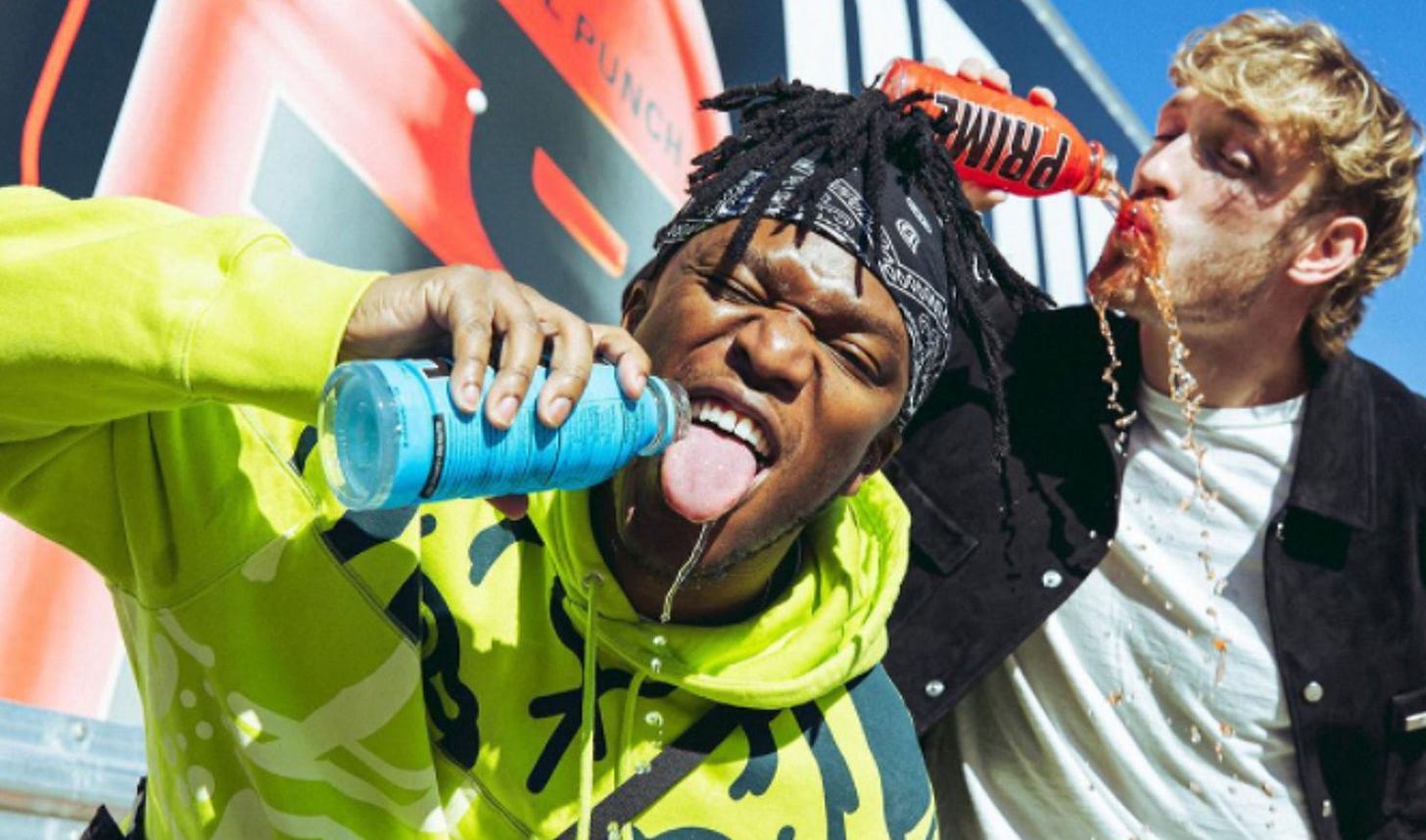A PRIME Example: Why top influencers are ditching brand deals 🧃
There is a lot that sports teams can learn from influencers. YouTubers KSI and Logan Paul's recent sponsorship deal with Arsenal for their new drinks brand, Prime Hydrate is the perfect example.
Not yet a subscriber? Join 1000+ sports business leaders from Fnatic to Formula 1 that read Sports Pundit every week to get impactful industry insights.
Influencer marketing has become imperative for many brands.
In fact, 93% of marketers report using influencer marketing as part of their strategies. For good reason, too. New research suggests 40% of consumers have made purchases due to influencer posts on Twitter, YouTube or Instagram. Brands that were early to adopt this strategy have reaped huge rewards. None more so than Gymshark, whose founder, Ben Francis, began sending merchandise to his favourite YouTube fitness personalities as far back as 2010. While brand success stories are often discussed, the scale of opportunity for influencers is less talked about. However, influencers are finally starting to wake up to the commercial power that they hold.
This realisation means that influencers are starting to launch their own ventures more and more, rather than simply being ambassadors for someone else.
This is for a couple of reasons:
1. Authenticity
Creating their own brand allows the influencer to remain true to their own style and personal values – rather than adapt to fit a specific brand’s narrative.
2. Personalisation
This plays into the second reason. By being authentic, they are able to create products that feel more personal and unique for their audience.
There is also a greater sense of co-creation as followers are often brought along on the business journey. They feel part of it and this sense of belonging goes a long way.
3. Returns
Lastly, there is the potential for a greater return – both financially and from a reputation or legacy perspective. The business venture provides them with a more long-term income (beyond their career as an influencer) and potentially greater profit as they will have a greater share of the financial impact that their influence brings. For an influencer with genuinely high engagement and low marketing costs (because they already have an audience), there is fairly low risk involved with launching their own product – provided it also meets the other criteria above.
The best example? PRIME Hydration – which was launched in the U.S. at the beginning of the year by YouTube royalty Logan Paul and KSI.
When they launched the drink, the pair said they were aiming to “rival some of the biggest companies on Earth” with their new drink, including “Pepsi, Coke, Gatorade, and Powerade.”
While a lofty ambition, within the first two months Prime had sold over 10 million bottles and announced that it was to be launched into over 2000 Target stores. A pretty good start.
It then expanded to the U.K. in May to equal fanfare. According to Logan Paul, 50,000 bottles were sold out within five minutes of being launched online and agreed a retail deal with Asda.
More recently, KSI and Logan Paul announced a sponsorship agreement to become Arsenal’s designated hydration partner in a bid to legitimise the drink as a genuine performance aid (similar to Powerade or Gatorade).

However, this, for me, is where things get interesting because sports teams are a lot like influencers. They;
have a loyal and devoted audience,
have a lot of talent and know how around their specialist area (i.e. fitness, high performance, gaming), and
have traditionally rented out their ‘platform’ to the highest bidder.
Given this insight, teams should be asking if they might be right to follow this influencer trend themselves.
And in fact, one club already has (and has been doing so for a couple of years now).
Rather than partnering with a well-known sports hydration brand like Lucozade or Gatorade, Chelsea decided to create its own in-house product, Blue Fuel.
It’s one of several offerings launched by Chelsea Digital Ventures, a consumer-focused business set up in 2018 and spun out of the club with a mission to leverage the club’s know-how and intellectual property to create products with appeal beyond the team’s fanbase.
The thinking is, rather than always responding to incoming pitches, the club can conceive authentic products itself using the expertise already in-house. A pretty similar rationale to that of the influencers.


While Blue Fuel hasn’t captivated the market to the same degree as Prime, it does provide some food for thought when considering the commercial models that are currently commonplace across the sporting landscape.
For instance, could we see a Premier League football team launch their own massage gun brand? Or could a cricket team launch their own apparel brand? Or a rugby team takes equity vs straight sponsorship dollars with a up and coming whiskey brand? (Similar to Conor McGregor and Proper Twleve).
Not yet a subscriber? Join 1000+ sports business leaders from Fnatic to Formula 1 that read Sports Pundit every week to get impactful industry insights.





